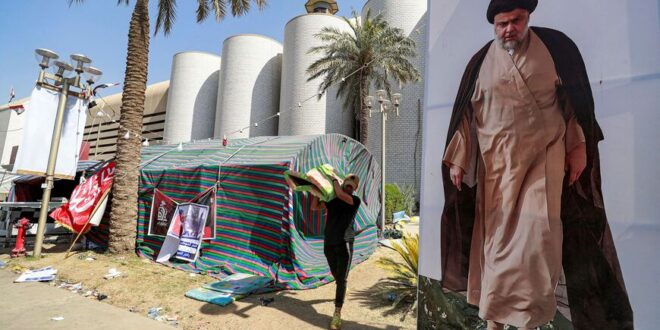The situation in Baghdad has calmed somewhat after cleric Muqtada al-Sadr called on his supporters to pull back.
Several regional countries have issued statements on the political violence in Iraq, expressing concern at the violence and urging calm.
Last night supporters of influential Shiite cleric Muqtada al-Sadr stormed the seat of the Iraqi government in Baghdad. Armed clashes ensued between the Sadrist Saraya al-Salam militia and Iran-backed Shiite militias within Iraq’s Popular Mobilization Units.
The conflict relates to the deliberations over a new government. Sadr’s bloc received the most votes in Iraq’s election in October, though it fell short of a majority and has been unable to form a government since then. Sadr supporters opposed the presidential candidate nominated in July by the Coordination Framework, which is an alliance of PMU groups, former Prime Minister Nouri al-Maliki and other Shiite politicians.
There have been protests for weeks, but the violence in Baghdad last night and earlier today involving heavy weaponry was a major escalation. There were also protests in other Iraq cities overnight.
Earlier today, Sadr called on his supporters to leave Baghdad’s Green Zone, where much of the fighting has taken place. Protesters started withdrawing from the area as a result.
Qatar expressed “deep concern” in a statement today and “called on all parties in Iraq to avoid escalation.”
Iraq’s Kurdistan Regional Government (KRG) Prime Minister Masrour Barzani also said today that he is “deeply troubled” by the events, adding that he spoke to Prime Minister Mustafa al-Kadhimi. “It is time for a full and frank dialogue about the deep, serious issues the country faces,” Barzani tweeted.
The KRG is currently embroiled in an oil dispute with the central government in Baghdad.
The United Nations’ Iraq mission commented on Sadr’s call for peace today, saying it “welcomes the most recent moderate declaration by Sayed Muqtada al-Sadr.”
Last night, Turkey also issued a statement of concern and called on all parties to “exercise restraint.”
Tensions are high between Turkey and Iraq at present. In July, alleged Turkish shelling targeting Kurdish fighters killed several Iraqi tourists.
Egyptian President Abdel Fattah al-Sisi also called Kadhimi last night. The Egyptian leader expressed his desire to see Iraq remain “strong” and with “civil peace,” the Iraqi prime minister’s office said in a tweet.
Iranian Foreign Minister Hossein Amir-Abdollahian likewise called for calm yesterday and said issues should be resolved legally. He made the comments in Tehran alongside his Iraqi counterpart Fuad Hussein, the official Islamic Republic News Agency reported.
The agency also reported last night that Iran closed its border with Iraq due to the unrest. Iran is a major political and economic ally of the Iraqi government. In addition to the support to its militia allies, Iran provides Iraq with electricity.
Kuwait also told its citizens to leave Iraq last night.
The United States called for calm last night but denied rumors that it had evacuated its embassy in Baghdad.
 Eurasia Press & News
Eurasia Press & News




